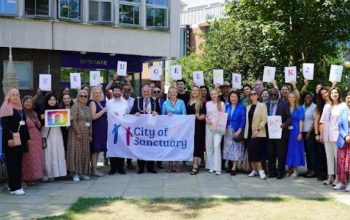Kingston Hospital NHS Trust has over twice the national average number of obstetric trauma. Dr Foster nationwide review of hospitals published last week, the percentage of patients who had an obstetric trauma, or serious tear, when giving birth naturally was off the scale at 7.8 per cent. The national average is 3.6 per cent.
Dr Foster nationwide review of hospitals published last week, the percentage of patients who had an obstetric trauma, or serious tear, when giving birth naturally was off the scale at 7.8 per cent. The national average is 3.6 per cent.
Obstetric trauma is defined by Dr Foster as a stage three tear or above which, according to the The Royal College of Obstetricians and Gynaecologists is one which extends downwards from the vaginal wall and perineum to the anal sphincter, the muscle that controls the anus.
A spokesman for Dr Foster, the company responsible for the hospital guide, described the figure as worrying and said: “It is an extremely high rate of obstetric tears.”
Kate Grimes, Chief Executive Kingston Hospital NHS Trust said: “There were 5,929 births at Kingston Hospital’s Maternity Unit last year. Along with the safety of expectant mothers and their babies, comfort and a good experience are also very important to us.
She added: “Published data reports 85 per cent of women who give birth naturally, will have some degree of vaginal tear or episiotomy (cut). In the most recent Care Quality Commission (CQC) Survey, 18 per cent of women that had a vaginal birth at the hospital reported that they did not have an episiotomy or tear and 82 per cent of women reported that their tear was repaired within an hour of giving birth.
“Our staff are encouraged to discuss optimal birth positions to minimise tears and recognise when to perform an episiotomy to try and prevent severe tears from occurring. The hospital monitors the situation monthly and the number of more serious tears at Kingston Hospital is comparable with other Trusts across London.
“Kingston Hospital is currently looking at a variety of actions to address the level of vaginal tears reported.”
The 7.8 per cent figure represents 252 women over the period from April 2010 to March 2011.
The Royal College of Obstetricians and Gynaecologists (RCOG) has recently released guidelines which recommend much higher levels of senior doctor presence on maternity wards than is currently provided in South West London.
Due to the lack of senior medical staff and cost cutting demanded by the Government, services across south west London such as maternity units may have to choose between having fewer units with more senior staff; keeping the same number of units with low senior staff presence; or having maternity units offering different levels of service. A health service review is currently underway.
Ms Grimes said: ” We recognise that it is necessary to review the financial viability of health care in south west London, and to ensure that patients receive the best possible care in the right setting for them. We want to work collaboratively with the rest of the sector to achieve a solution to the challenges facing SW London. Our maternity services are very popular with our local community and we were voted the best maternity unit in the whole of London in a Care Quality Commission (CQC) survey earlier, by mothers who had given birth here – 86% of whom rated us excellent or good.”
The CQC survey rated the Kingston the best hopital in London for maternity sevice by mothers who gave birth in February 2010.




